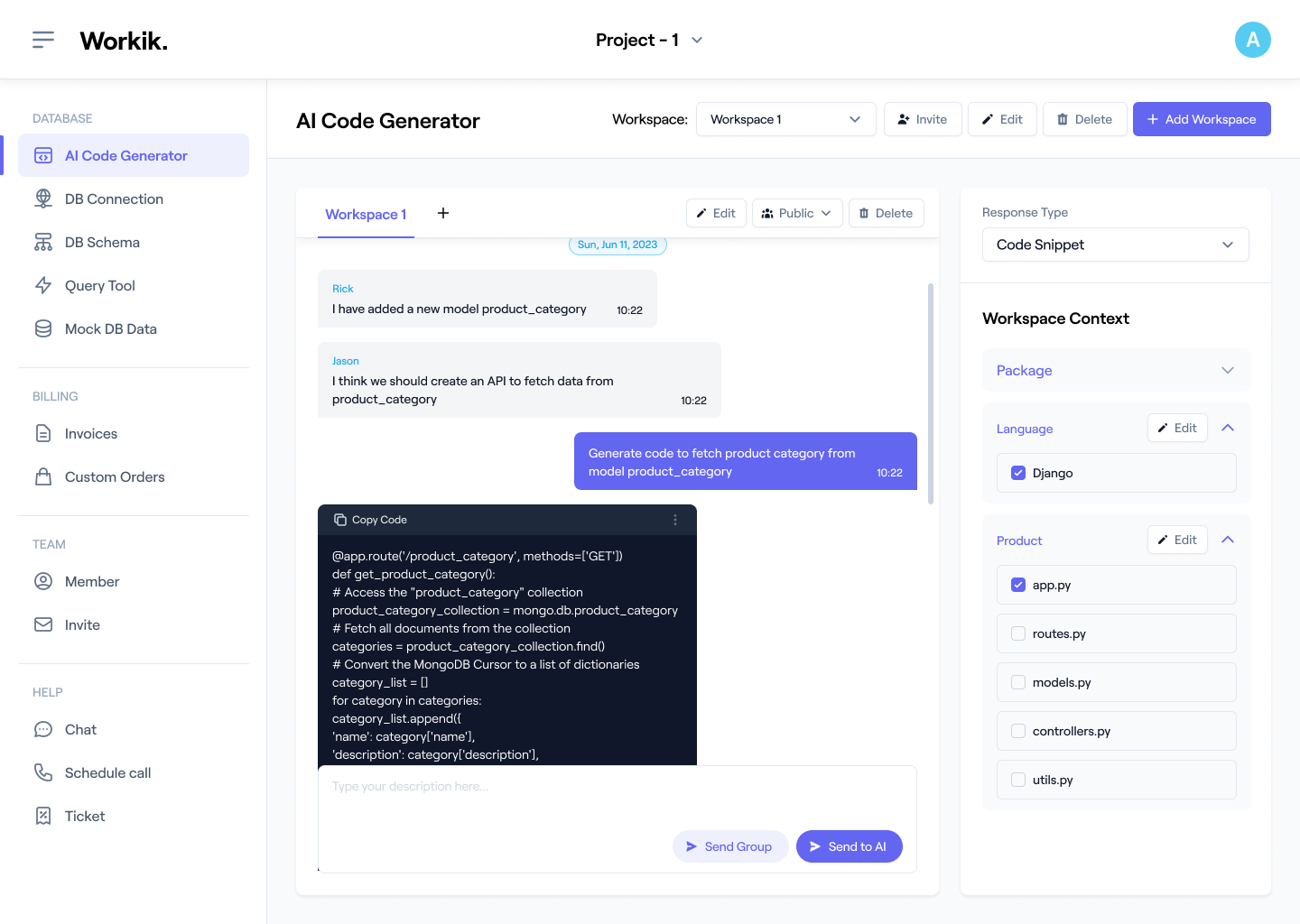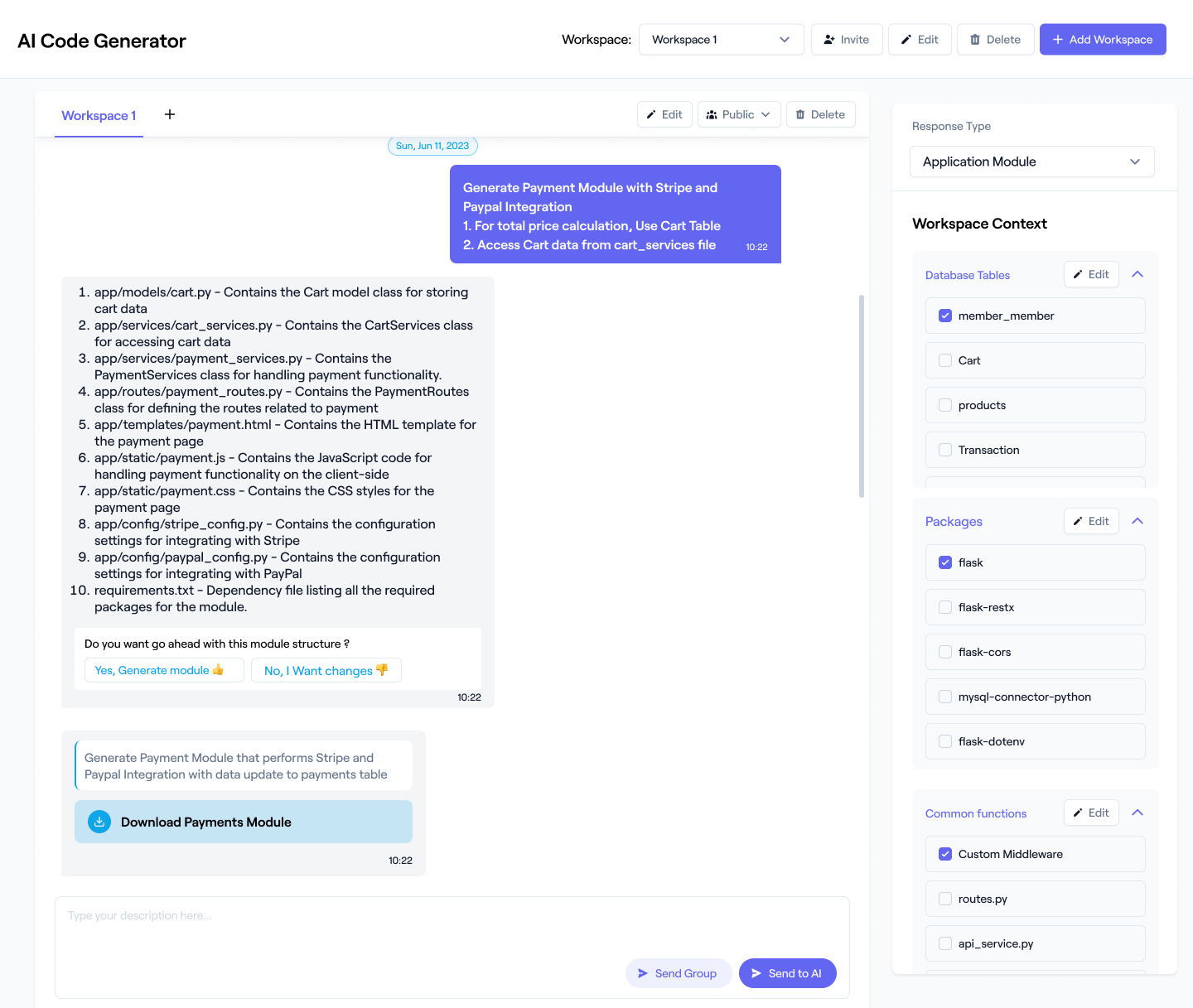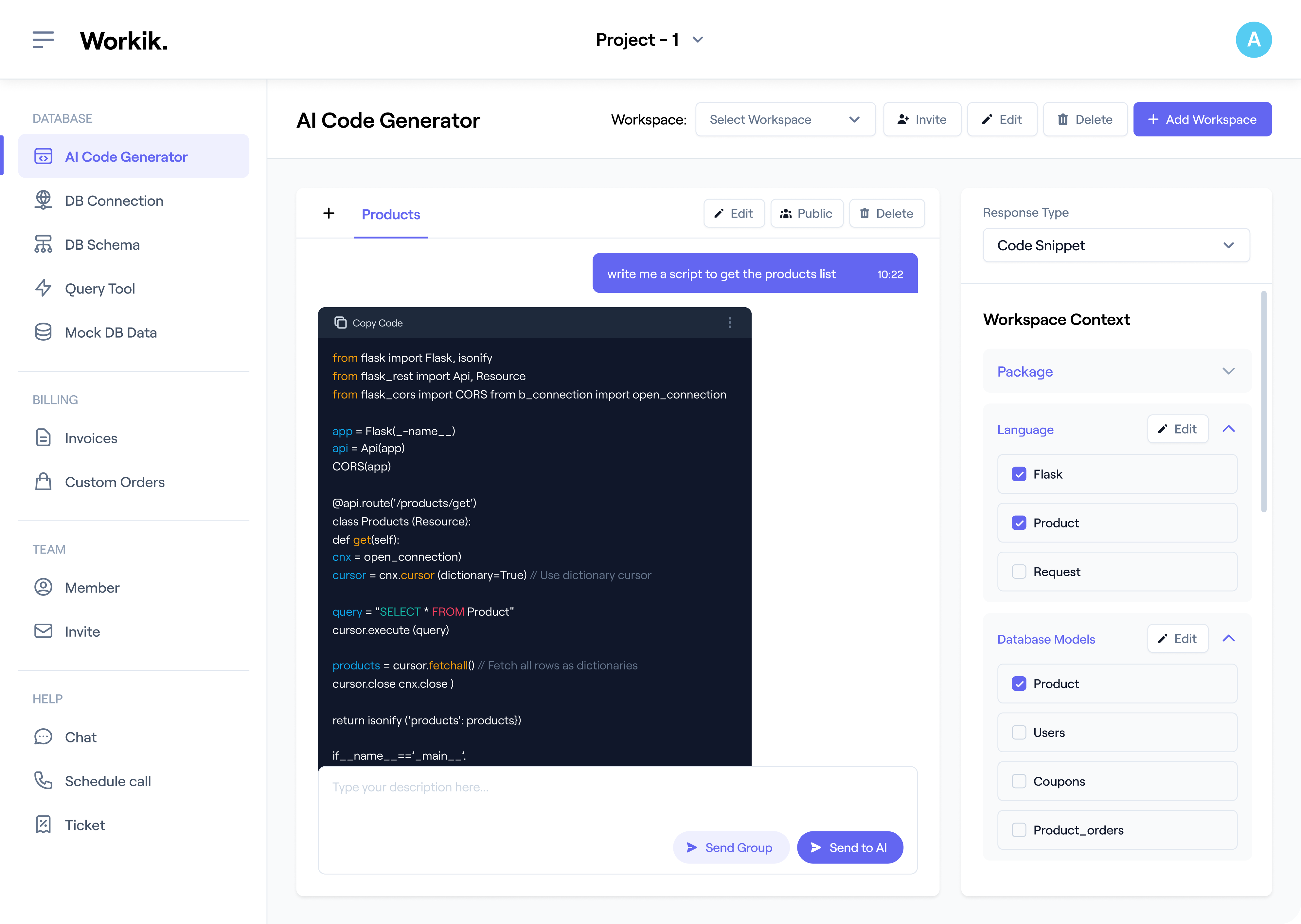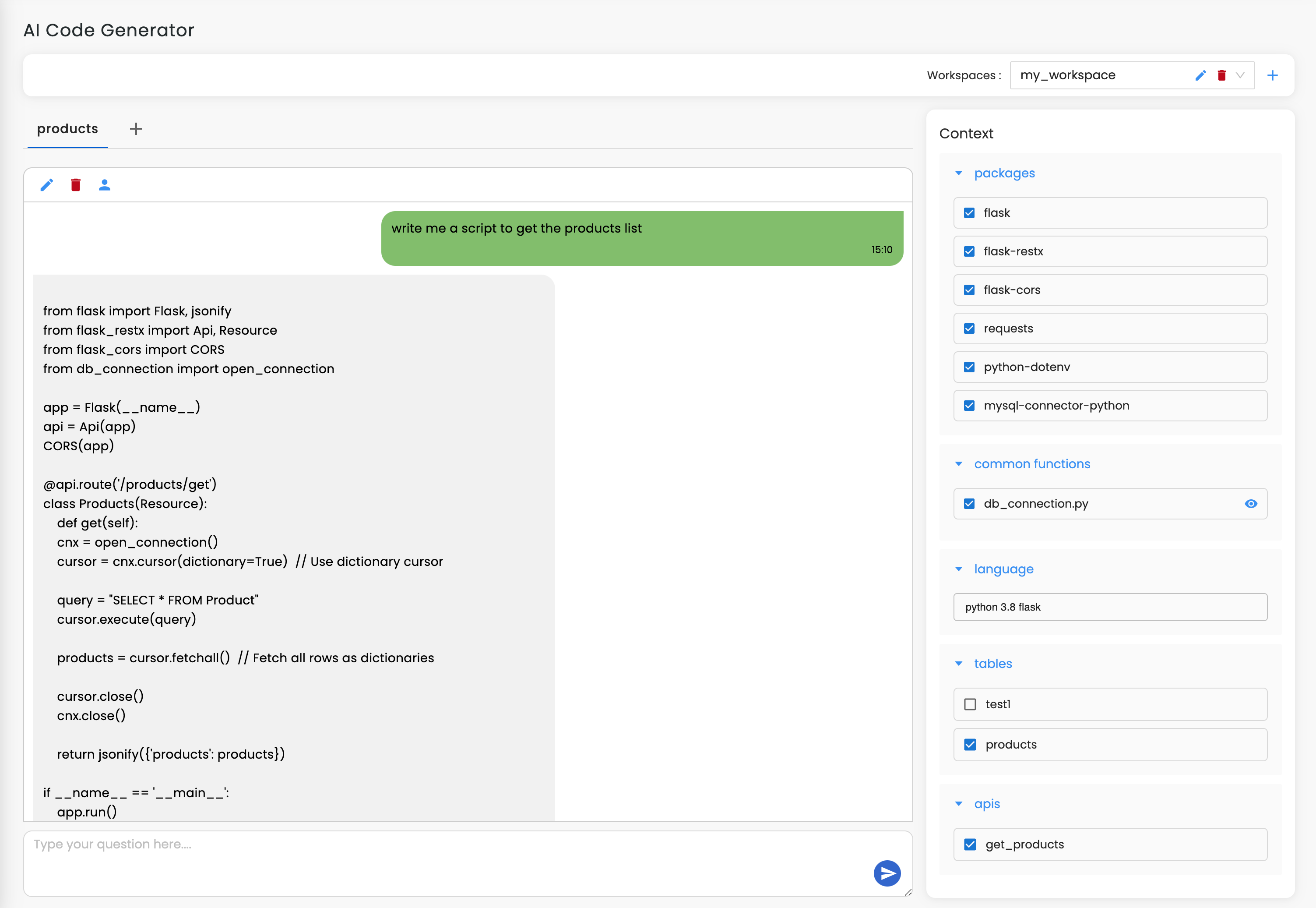
Join our community to see how developers are using Workik AI everyday.
Supported AI models on Workik
GPT 5.2, GPT 5.1 Codex, GPT 5.1, GPT 5 Mini, GPT 5, GPT 4.1 Mini
Gemini 3 Flash, Gemini 3 Pro, Gemini 2.5 Pro, Gemini 2.5 Flash
Claude 4.5 Sonnet, Claude 4.5 Haiku, Claude 4 Sonnet, Claude 3.5 Haiku
Deepseek Reasoner, Deepseek Chat, Deepseek R1(High)
Grok 4.1 Fast, Grok 4, Grok Code Fast 1
Models availability might vary based on your plan on Workik
Features

Generate API Code
AI can create client/server code from Swagger using AI. Supports Java, Python, Node.js for smooth integration.

Sync API Specs
AI can keep OpenAPI specifications aligned with GitHub, GitLab, or Bitbucket, ensuring code and docs stay consistent.

Mock Server Setup
AI generates mock servers from OpenAPI specs for fast API testing with Postman or local environments.

Optimize Documentation
Use AI to generate Swagger OpenAPI docs with REST best practices. Customize using Redoc or Swagger UI.
How it works
Create a Workik account and set up your Swagger/OpenAPI project. Choose the language (Java, Python, Node.js) for API generation, and upload your API specs.
Integrate API specs from GitHub, GitLab, or Bitbucket. Define endpoints, request/response formats, authentication methods, and security protocols for AI to generate precise code.
Use AI to generate API code and mock servers. Validate and debug API behavior, data models, and schemas, ensuring alignment with RESTful principles and efficient integrations.
Invite your team to Workik for collaborative API development. Automate testing, documentation generation, and API deployment via CI/CD pipelines for seamless project management.


Expand


Expand


Expand


Expand


Expand


Expand


Expand


TESTIMONIALS
Real Stories, Real Results with Workik
Workik’s AI Swagger generation saved us weeks of coding and streamlined our workflow.

Adrian Carter
Senior Backend Engineer
Syncing Swagger specs with GitHub and testing APIs with mock servers was effortless—game changer!

Raj Patel
Full-Stack Developer
As a beginner, Workik made Swagger code generation easy, letting me focus on learning API flows.

Mia Johnson
Junior API Developer
What are the popular use cases of Workik's AI for Swagger OpenAPI generation?


Popular use cases of Workik’s AI-powered Swagger OpenAPI generation include:
* Generate client and server code from OpenAPI specs in languages like Python, Java, and Node.js.
* Create mock APIs to test endpoints before deploying the backend.
* Generate API documentation with Swagger UI or Redoc.
* Validate and optimize OpenAPI schemas for structure, security, and compliance.
* Integrate OpenAPI with CI/CD for automated testing and deployment.
What kind of context can I add in Workik AI related to Swagger OpenAPI generation?


Setting context in Workik is optional but enhances AI-generated Swagger OpenAPI code. Here are the types of context you can add for Swagger OpenAPI generation:
* Programming languages (e.g., Python, Java, Node.js)
* Codebase files (import API projects from GitHub, GitLab, or Bitbucket to sync with your specs)
* API specs (e.g., Swagger, OpenAPI 3.0)
* Libraries (e.g., Express.js, Flask, Spring Boot for API integration)
* Database schemas (e.g., MongoDB, MySQL, PostgreSQL for full-stack API development)
How can Workik help me maintain multiple API versions using Swagger OpenAPI?


Workik’s AI generates version-specific API code and documentation, ensuring changes in one version don’t break another. It manages both v1 and v2 APIs, generating code and docs for each, streamlining API versioning while maintaining backward compatibility.
Can Workik AI assist in integrating third-party APIs with my Swagger-generated APIs?


Yes, Workik’s AI analyzes your OpenAPI specs and external API documentation. It generates glue code for seamless integration with services like Stripe, Twilio, or Google APIs. For example, it automates handler and response schema creation, aligning your internal API with external services, reducing manual effort.
Can Workik improve API security with Swagger/OpenAPI specs?


Yes, Workik’s AI enhances security by identifying vulnerabilities in OpenAPI specs, such as missing OAuth 2.0 or token-based authentication. It can generate secure configurations, enforce HTTPS, validate input schemas, and suggest best practices for rate limiting and CORS.
How can Workik AI integrate Swagger OpenAPI specs into microservices?


Workik’s AI generates service-specific APIs from OpenAPI specs for microservices architectures, providing well-documented interfaces and API gateway configurations. This ensures seamless communication between microservices in setups like Kubernetes or Docker.
Can Workik AI automate API testing with Swagger OpenAPI specs?


Yes, Workik AI generates test cases from OpenAPI specs, automating endpoint validation, response schema checks, and error handling. You can integrate these tests into CI/CD pipelines, ensuring continuous testing for every code change.
How does Workik handle breaking changes or inconsistent API schemas?


Workik detects breaking changes in endpoints, parameters, and schemas, enforces semantic versioning, and generates deprecation notices with migration guides. It resolves inconsistencies by aligning types and updating dependencies across codebases and tests automatically.
Generate Code For Free

Swagger OpenAPI: Question and Answer
Swagger OpenAPI is an industry-standard specification used to describe and define RESTful APIs. It allows developers to create a structured, machine-readable format for API documentation, which can be used to generate code, test cases, and interactive API documentation. Swagger OpenAPI is widely used to streamline API development by enabling clear communication between backend services and front-end or third-party integrations.
Popular tools and libraries for Swagger OpenAPI include:
Code Generation:
Swagger Codegen, OpenAPI Generator
Testing:
Postman, Newman, Dredd
Documentation:
Swagger UI, Redoc
Security:
OAuth 2.0, JWT
Mocking APIs:
Prism, WireMock
Version Control:
GitHub, GitLab, Bitbucket
Validation:
Spectral, OpenAPI Linter
Popular use cases of Swagger/OpenAPI include:
Healthcare:
Standardizes APIs for EHR integration and FHIR, enabling secure data exchange among providers.
Financial Services:
Defines APIs for Open Banking, allowing secure access to banking services while meeting regulations.
E-Commerce:
Used by platforms like Shopify and Amazon to integrate payment gateways, shipping, and inventory systems seamlessly.
Telecommunications:
Manages VoIP and messaging APIs for SMS and call routing, enhancing customer communication.
Logistics and Supply Chain:
Automates communication with carriers and warehouses, streamlining shipment tracking and order management.
Travel and Hospitality:
Standardizes APIs for booking, flight schedules, and hotel availability, facilitating interactions between agencies and providers.
Career opportunities and technical roles available for professionals in Swagger/OpenAPI include Backend Developer, Full-Stack Developer, API Developer, DevOps Engineer, API Architect, Technical Writer (API documentation specialist), API Tester/QA Engineer, and Integration Specialist (for third-party API integrations).
Workik AI provides extensive support for Swagger/OpenAPI development, including:
Code Generation:
Generates client and server code from Swagger/OpenAPI specs in multiple languages (e.g., Java, Python, Node.js).
Mock Servers:
Creates mock APIs for testing endpoints before deploying the backend.
API Testing:
Automates the generation of test cases and validation scripts based on OpenAPI specs.
Documentation:
Helps generate and update Swagger/OpenAPI documentation with Swagger UI or Redoc.
Schema Validation:
Analyzes OpenAPI specs to validate schema consistency, security, and compliance with best practices.
Security Enhancements:
Suggests improvements for securing APIs, such as adding OAuth 2.0 or enforcing HTTPS.
CI/CD Integration:
Facilitates API testing and deployment in CI/CD pipelines using the OpenAPI specification.
Explore more on Workik
Get in touch
Don't miss any updates of our product.
© Workik Inc. 2026 All rights reserved.

